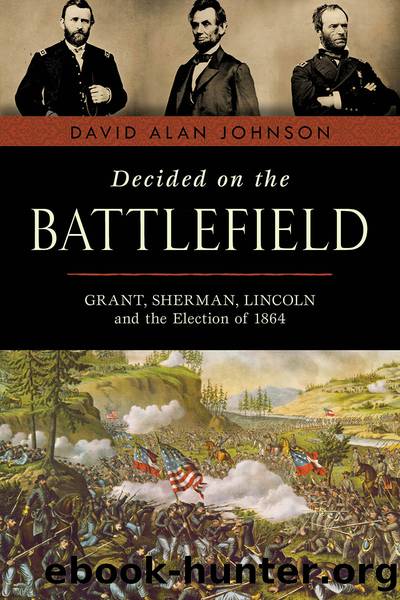Decided on the Battlefield by David Alan Johnson

Author:David Alan Johnson
Language: eng
Format: epub
Publisher: Prometheus
Published: 2020-08-11T00:00:00+00:00
WITH A BULLDOG GRIP
The management of the Express, a newspaper in Buffalo, New York, displayed a large sign outside of its building: âGOD â GRANT â VICTORY.â26 This was a very nice gesture by the owners of the paper, and was probably much appreciated by the patriotic citizens of Buffalo, but nobody knew exactly what it meantâwas it a plea for God to grant victory, or did it mean that God plus Grant equaled victory?
Throughout the North, an increasing number of the population would not have seen any meaning in either interpretation. If God had any intention of granting victory to the North, in this increasingly discouraging summer, he certainly had a strange way of going about it. And if God plus Grant was supposed to equal victory, more and more people were wishing that Grant would be left out of the equation. The Expressâs sign maker made no mention of Abraham Lincoln, which was probably just as well. The general opinion of Lincoln was even lower than the opinion of Grant.
General Grantâs reputation was probably at its lowest point in those late-summer weeks. He had not destroyed Leeâs army; he had not captured Richmond; he could not seem to extract himself from Petersburg; and everything he had done up to this point, all his failures put together, had resulted in nothing but thousands of dead and wounded. The Democrats were calling him a butcherââButcher Grant.â Sometimes he was called a drunken butcher. Even the presidentâs wife, Mary Todd Lincoln, said that Grant was a butcher and that she could do a better job of running the army herself.
Actually, Grant was no more of a butcher than many other generals on both sides, including Robert E. Lee. In fact, Lee had a higher rate of casualties, dead and wounded, than Grant. âLee was more reckless with menâs lives,â a biographer of Grant noted, âyet got away with it.â27 The most pointed example of Leeâs disregard for casualties is Pickettâs Charge, at Gettysburg, which resulted in many more casualties than Grantâs attack at Cold Harbor. Another historian grumbled, âIf any general deserved the label âbutcher,â it was Lee.â28 But Grant had been called âbutcherâ too many times in the Northern press, especially by anti-Lincoln papers, and the name stuck.
But General Grant was not about to let this break his stride or change his style. His objective was still the same as it had been since Mayâthe destruction of Leeâs army. He was well on his way to attaining this goal, and he knew it. At this point in time, Robert E. Lee also knew it. Grant had the men and the resources and the determination to keep on grinding Lee and wearing him down until he had no option but to surrender. Maybe the majority of voters in the North did not see this in August 1864, but both Grant and Lee did.
In mid-August, Grant decided to make an advance toward Richmond to distract Lee from reinforcing Jubal Early in the Shenandoah.
Download
This site does not store any files on its server. We only index and link to content provided by other sites. Please contact the content providers to delete copyright contents if any and email us, we'll remove relevant links or contents immediately.
| United States | Abolition |
| Campaigns & Battlefields | Confederacy |
| Naval Operations | Regimental Histories |
| Women |
In Cold Blood by Truman Capote(3374)
The Innovators: How a Group of Hackers, Geniuses, and Geeks Created the Digital Revolution by Walter Isaacson(3142)
Steve Jobs by Walter Isaacson(2889)
All the President's Men by Carl Bernstein & Bob Woodward(2362)
Lonely Planet New York City by Lonely Planet(2215)
And the Band Played On by Randy Shilts(2197)
The Room Where It Happened by John Bolton;(2150)
The Poisoner's Handbook by Deborah Blum(2131)
The Innovators by Walter Isaacson(2096)
The Murder of Marilyn Monroe by Jay Margolis(2094)
Lincoln by David Herbert Donald(1981)
A Colony in a Nation by Chris Hayes(1926)
Being George Washington by Beck Glenn(1907)
Under the Banner of Heaven: A Story of Violent Faith by Jon Krakauer(1788)
Amelia Earhart by Doris L. Rich(1686)
The Unsettlers by Mark Sundeen(1682)
Dirt by Bill Buford(1669)
Birdmen by Lawrence Goldstone(1661)
Zeitoun by Dave Eggers(1643)
